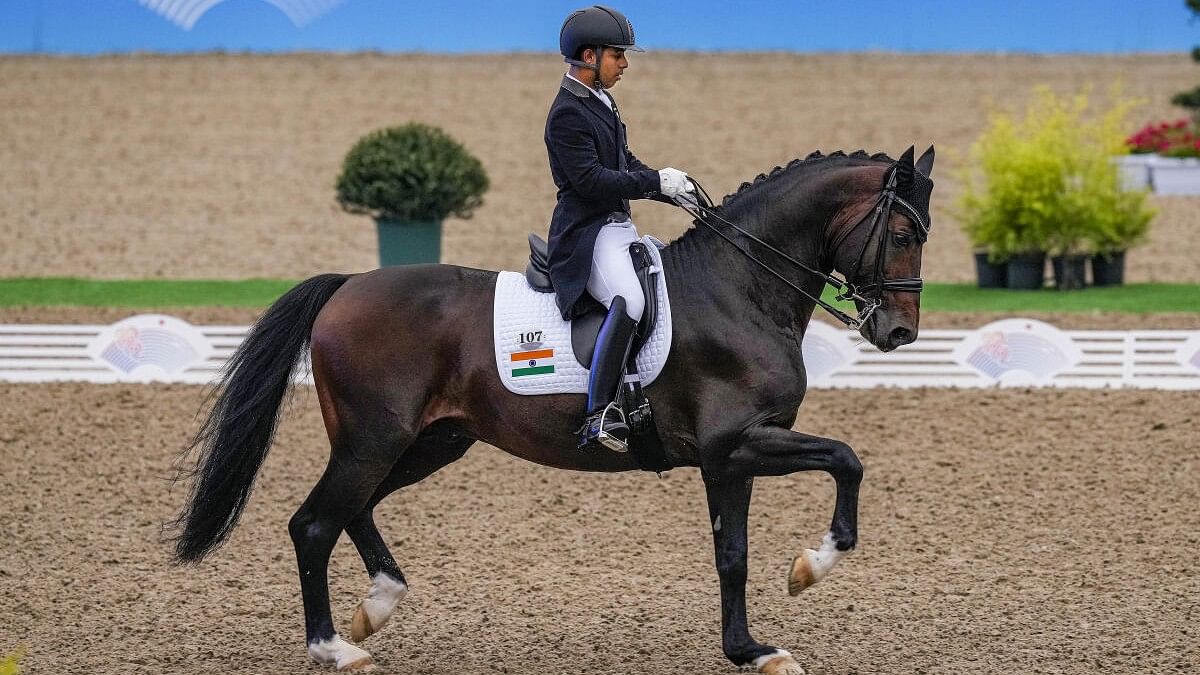
The 24-year-old Anush is the first Indian equestrian to qualify in individual dressage event at the Olympic Games.
Credit: PTI photo
New Delhi: It does not take long for Anush Agarwalla to understand if his horse, Sir Caramello, is feeling nervous, excited or happy. After all language is not a barrier, if a relationship is built on harmony and trust.
The 24-year-old Anush is the first Indian equestrian to qualify in individual dressage event at the Olympic Games, beginning July 26.
As he gears up to compete in Paris, Anush is not worried about the results. He just wants to "fly" with Sir Caramello when he enters the arena.
Such is the bond between the two that taking care of his horse is more important than taking care of himself.
"Without the horses, we are nothing. Of course, you need to be a good rider. You need to have a good coach. But without the right horse, you are nothing," Agarwalla told PTI from Germany.
Agarwalla moved to Paderborn in Germany as a 17-year-old and his weekend hobby of horse riding with no real competitive aspirations soon turned into a passion. With hard work and proper guidance he climbed the podium at the Hangzhou Asian Games twice -- individual bronze and team gold last year.
The Kolkata-born rider said he shares a superb bond with his horse but it took a long to develop that trust. It's been five years that Agarwalla has been riding with Sir Caramello.
Initially the horse would not trust Agarwalla but consistent feeding, cuddling, riding, cleaning, taking him out created that trust. He had to work hard to win over Sir Caramello.
"Building relationships with horses, it's just like building relationships with people. It takes time. Relationships are not built over a matter of a couple of hours or a couple of days. I spent a lot of time together with him.
"I would say that he always wants me to give him 100% attention. That's the most important thing for him. He always wants me to scratch him on the back. He's a horse who loves contact with humans." He says Sir Caramello always wants to go out, even if it's raining or snowing: "He will pull me and take me to every corner. He wants to see everything. He just enjoys it, and I just let him do his thing." And this bond is a must if the rider is competing in Dressage which is different from Eventing and Show Jumping.
In Dressage, the horse and rider perform a series of pre-determined movements. The suppleness, flexibility and obedience of horse is tested in this event.
Dressage is physically demanding and mentally challenging for the horse.
"The horse is the main member of the team, I would say. What really attracted me to dressage was that though power is involved it still has to look elegant and that you are completely in sync with your horse." "When you ride in the arena, the whole stadium is full and the horse is completely with you. It really feels like you're flying, there's no better feeling in the world."
When humans join forces, teammates can express their apprehensions and excitement through words and body language. But when your teammate is an animal how do you do it? "I just have to look at him and I know how he's feeling. I know exactly what he needs. And that is the definition of trust and a relationship. I do not think that a trust, a relationship really needs a language." Agwaralla shared an incident when he could sense how his horse suddenly grew impatient and how he calmed it down.
"When we competed at the 2022 World Championships, during the warm-up, he was feeling really good. We were really in sync and everything was perfect. And then we came into the 10-minute arena where we were completely alone. And in that moment, I started to feel like he started getting nervous.
"I was only 22 years of age, even I, somehow in those first two or three minutes could not really help him. Then I just patted him, kind of spoke with him. I could really sense him, like, really breathe out. And then we were back in our motion. So, that was for me, personally, a very nice moment." Agarwalla knows consistent hard work is the key and he also understands that defeats have to be embraced as much as victories.
"I think defeat teaches you much more than victories. It shows you what you have to work on.
"Defeat also shapes you a lot as a person. It teaches you that you have two options: either you keep crying and quit or you say, okay, you take it on the chin, I had a defeat, but I'm going to make sure my next event will be a victory.
"It really teaches you to bring out a power from within yourself, a motivation from within yourself that you probably didn't know was even there. And I think that, in this moment, is when you improve the most." Ask him about his rivals and his own expectations at the Paris Olympics where men's and women compete together, Agarwalla preferred not to over-promise.
"Of course, I know who all I'm competing against. But what I like to do or what I've always done and will continue to do now before the Olympics is focus on myself. That's the only thing which is in my own power. I cannot influence the others' performances, nor do I want to." Agarwalla is also mature enough to leave behind the fact that his candidature for the Olympics was challenged by veteran rider Shruti Vora.
"There is no bitterness," he said.